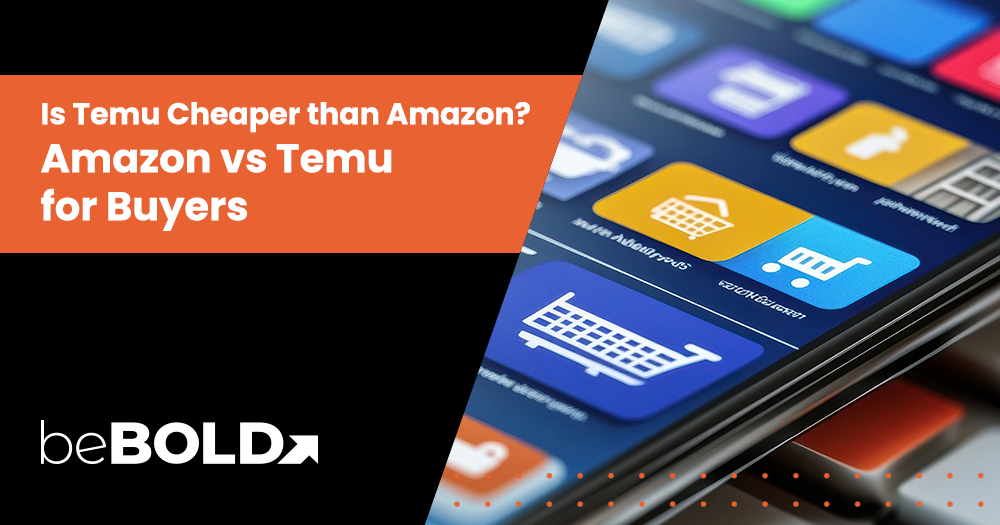Key Summary
- Temu is generally cheaper than Amazon by around 40% for generic or “close-match” items.
- Identical branded products show little difference (only 1% cheaper on Temu), and sometimes Amazon is cheaper (notably in Automotive) 🚗
- Temu’s strength lies in Fashion, Beauty, Jewelry, and Home items, while Amazon dominates in branded products, Automotive, and appliances 👗🏠
- Amazon wins on trust, warranties, reviews, and shipping speed, while Temu appeals with aggressive discounts and factory-to-consumer pricing ⚡📦
- Returns and after-sales support are smoother on Amazon, while Temu policies are often stricter and slower 🔄
Category Comparison: Which is Cheaper?
Choosing between Temu and Amazon isn’t just about where you can save a few dollars. It’s about balancing price with quality, trust, and long-term value. With Temu rapidly gaining traction as a budget-friendly marketplace and Amazon still leading in global eCommerce, shoppers are asking the big question: which one is truly cheaper, and at what cost?
Here’s how pricing stacks up across categories:
|
Category |
Winner |
Why |
|
Unique Finds |
Temu |
Direct-from-factory quirky items at ultra-low prices |
|
Beauty & Personal Care |
Temu |
40% cheaper for look-alikes, but fewer branded options |
|
Health & Household |
Amazon |
Trusted brands, faster delivery, warranties |
|
Musical Instruments |
Amazon |
Wider selection, better quality assurance |
|
Clothing, Shoes & Jewelry |
Temu |
Almost 94% overlap with Amazon; Temu is 40% cheaper |
|
Home & Kitchen |
Temu |
Big savings on unbranded decor and gadgets |
|
Arts, Crafts & Sewing |
Temu |
Cheaper on supplies, though Amazon has more variety |
|
Appliances |
Amazon |
Stronger in large and branded electronics |
Unique Finds
Temu thrives in offering low-cost gadgets, fashion accessories, and home goods you won’t easily find on Amazon. These items are often sourced directly from factories, giving Temu a clear pricing advantage. In fact, many of these products are marketed as impulse buys: USB gadgets, novelty décor, or small kitchen tools that appeal to budget-conscious shoppers looking for fun or trendy items. Amazon carries some of these categories, but its catalog is often brand-driven and priced higher due to international logistics and better quality control.
Beauty & Personal Care

In categories like skincare, makeup tools, and accessories, Temu is about 40% cheaper on close-match products. However, branded beauty lines remain more reliable and accessible on Amazon. For consumers who value authenticity and dermatologist-backed brands, Amazon is usually the safer option. Temu wins mostly on generic makeup brushes, organizers, and trending accessories that don’t require brand loyalty.
Want to learn how to build your beauty brand on Amazon? Learn more about it here: Amazon Professional Beauty: A Simple Guide to Break-In
Health & Household


Amazon dominates here with trusted household brands, warranty coverage, and faster shipping. Temu’s price advantage diminishes because brand reputation matters more in this category. Products like supplements, cleaning solutions, or health devices are often cheaper on Temu but may raise concerns about regulatory compliance or authenticity.
Musical Instruments


Amazon remains the stronger choice with reliable suppliers, warranties, and global music brands. Temu mostly offers low-cost knockoffs, which can be risky. Entry-level students might find cheap practice items on Temu, but professionals and hobbyists usually prefer Amazon’s vetted selection.
Clothing, Shoes & Jewelry


Temu’s overlap with Amazon is strongest here (nearly 94%), and pricing is almost 40% lower on average. Fashion and accessories are Temu’s biggest win, with countless trendy fast-fashion items available at a fraction of the cost. Amazon still offers more established brands and better sizing consistency, which can matter for repeat buyers.
Home & Kitchen


Temu is the go-to for budget shoppers seeking small appliances, organizers, and décor. Amazon, however, wins in higher-end kitchenware. Temu thrives in selling multi-purpose tools, organizers, and novelty cooking gadgets that often go viral on social media. Amazon’s advantage comes with premium cookware, established home brands, and fast replenishment for household basics.
Arts, Crafts & Sewing


Temu often lists cheaper supplies and bundles, though Amazon still has more premium and brand-name options. Crafters on a budget may love Temu for bulk beads, fabric swatches, or DIY kits, while serious hobbyists and professionals stick with Amazon for quality assurance and specific brands.
Appliances


Amazon dominates, particularly in branded electronics and large appliances, where Temu can’t match warranties or trust. While Temu lists mini-appliances and novelty gadgets, Amazon remains the go-to for durable refrigerators, washers, and established tech brands. Temu may lure bargain hunters, but Amazon still dominates where it matters most for long-term brand growth.
Category Matching: Amazon vs Temu
Studies show that 77% of Amazon products have a Temu equivalent, but only 10% are identical to them. This highlights that Temu primarily competes with “look-alikes” rather than the same branded items. See the matching result of Temu vs Amazon categories by Omnisend
|
PRODUCT CATEGORY |
MATCHED* |
IDENTICAL** |
|
Appliances |
84.00% |
9.52% |
|
Arts, crafts & sewing |
80.00% |
15.00% |
|
Automotive |
80.00% |
10.00% |
|
Baby |
52.00% |
0.00% |
|
Beauty & personal care |
96.00% |
4.17% |
|
Camera & photo products |
96.00% |
0.00% |
|
Cell phones & accessories |
80.00% |
0.00% |
|
Clothing, shoes & jewelry |
92.00% |
4.35% |
|
Computers & accessories |
76.00% |
10.53% |
|
Electronics |
80.00% |
5.00% |
|
Grocery & gourmet food |
28.00% |
14.29% |
|
Health & household |
64.00% |
12.50% |
|
Home & kitchen |
92.00% |
8.70% |
|
Industrial & scientific |
76.00% |
10.53% |
|
Kitchen & dining |
92.00% |
13.04% |
|
Musical instruments |
92.00% |
4.35% |
|
Office products |
92.00% |
17.39% |
|
Patio, lawn & garden |
72.00% |
16.67% |
|
Pet supplies |
76.00% |
10.53% |
|
Sports & outdoors |
76.00% |
5.26% |
|
Tools & home improvement |
92.00% |
13.04% |
|
Toys & games |
64.00% |
12.50% |
|
Unique finds |
60.00% |
25.00% |
|
Average through all categories |
77.00% |
9.67% |
*A Temu item that shares key features and functions with an Amazon product, even if small
** The product is identical and from the same brand on both platforms.
Omnisend’s analysis shows the highest overlap in categories like Clothing, Shoes & Jewelry, and Beauty, with nearly 94% of Amazon’s catalog having similar versions on Temu. By contrast, overlap is lowest in categories such as Food & Beverage, where Temu listings are much more limited.
Importantly, the price gap depends on the type of match: close-match products average about 40% cheaper on Temu, while identical branded products show almost no difference (about 1% cheaper). In some categories, such as Automotive, Amazon is actually cheaper by around 12%, indicating that the winner shifts depending on the product type and buyer priorities.
Why Temu Feels Cheaper: Temu's Pricing Strategy
Pricing is one of the biggest reasons Temu has managed to capture shopper attention so quickly. By structuring its marketplace differently from Amazon, Temu is able to advertise steeper discounts and flash sales, making it consistently more affordable. Here’s how the numbers compare:
|
Platform |
Discounted Items % |
Average Discount Depth |
|
Temu |
65% of items |
Deep discounts, often 40–70% |
|
Amazon |
47% of items |
More modest deals, stronger on branded goods |
Temu keeps prices low through factory-direct sourcing, fewer middlemen, and steep promotions. But this also means that quality and consistency can vary widely.
When comparing low-cost marketplaces and price-driven competition, Amazon Tariff explains how import duties and trade costs can quietly influence product pricing and margin pressure.
Temu's Product Knockoff Problem


One of the biggest trade-offs when choosing Temu’s low prices over Amazon is the elevated risk of counterfeit, unsafe, or otherwise non-compliant goods surfacing on the platform. In fact, designers and independent brands have been raising alarms, with numerous reports indicating that near-identical clones of original designs, logos, and trademarks are being sold by third-party sellers, often for just a fraction of the cost.
For example, a Raleigh artist discovered her artwork was replicated and sold on Temu at a hugely reduced price, using her original photos and description. In many cases, these knockoffs are aggressively marketed, even appearing at the top of sponsored listings in searches for premium branded products. But what does it mean for buyers and sellers?
- For buyers: The low price may come with risks: product quality, safety, and authenticity are not guaranteed. Be especially cautious in categories where counterfeit or safety issues matter (like electronics, children’s goods, medical devices).
- For Amazon brands or sellers: This environment presents both opportunity and threat. Opportunity to differentiate via authenticity, quality, and brand trust. Threat from look-alikes and knockoffs that mimic your product and steal sales based often purely on price.
Amazon vs. Temu: Seller Profitability
Margins can make or break sellers, and this is one area where the contrast between Temu and Amazon becomes very clear.
Each platform shapes seller profitability differently, with Temu pushing extreme low pricing while Amazon leaves more room for brand-driven sustainability.
Temu’s model prioritizes rock-bottom prices, but at a steep cost for sellers:
- The pricing model is often unsustainable for sellers, as they are pushed to sell at razor-thin margins.
- Suppliers are pressured into offering ultra-low prices to stay listed, leaving little room for profit.
- Sellers face higher risks of chargebacks, counterfeit complaints, and inconsistent demand driven by flash discounts.
- Typically attracts sellers looking for short-term volume rather than durable growth.
Amazon remains highly competitive but provides better profitability opportunities:
- Still highly competitive, but provides more pathways for profitability.
- Especially strong for niche, branded, or premium products where trust and reputation support healthier margins.
- More viable as a long-term platform for serious eCommerce brands seeking sustainable growth.
Amazon vs. Temu and Your Next Step with beBOLD Digital
When it comes to which platform offers the cheapest prices, Temu would win hands down, especially in the fashion, beauty, and home goods categories. However, Amazon still takes the lead in appliances, household essentials, branded items, and trust factors. Bargain hunters may enjoy Temu’s quirky deals, but shoppers who prioritize reliability, warranties, and speed will usually find Amazon the smarter choice.
In short, Temu excels at short-term savings, while Amazon continues to deliver long-term value and confidence, especially for brands aiming to build credibility and scale. If your goal is to grow and protect your brand on Amazon, the right strategy makes all the difference.
Book a quick call with beBOLD Digital today and let us help you optimize your listings, boost profitability, and create sustainable growth in a fast-changing eCommerce landscape.
Frequently Asked Questions
Are Temu products eligible for warranties or guarantees like Amazon purchases?
Mostly no. Temu products often lack brand warranties, while Amazon purchases usually include them.
Can you use gift cards or digital wallets on Temu like on Amazon?
Temu accepts major cards and some wallets, but lacks Amazon’s robust gift card ecosystem.
Does Temu offer a subscription service similar to Amazon Prime?
No. Amazon Prime still dominates with free fast shipping, Prime Video, and exclusive deals.
How do taxes and customs duties differ when buying from Temu vs Amazon?
Amazon includes taxes in the checkout; Temu items may face import duties/customs delays, depending on location.
Is Temu better for bulk or wholesale buying compared to Amazon?
Temu is cheaper upfront, but Amazon offers better bulk reliability, shipping speed, and returns.
Is it safe to order from Temu right now?
Yes, though product quality and shipping reliability vary. Amazon remains safer overall.
Is Temu banned from shipping to the USA?
No. Temu ships to the US, though tariff policies may affect costs in the future.
What country is Temu located in?
Temu is headquartered in Boston, USA, but operates under PDD Holdings, which is based in China.










Comments